#CRM Customization
Explore tagged Tumblr posts
Text
The Power of CRM Customization for Your Business Success | Solid Future
In the competitive market of today, CRM is that glass dome through which any business proudly stands out in order to scale up. However, standard CRM solutions available in the market fail to fulfill the specific needs of your business. Therefore, customization of the CRM system has emerged as a very important concept. CRM customization of the system to a specific workflow helps to improve objectives and customer interactions can further expedite processes, customer satisfaction, and finally, revenue growth.
CRM customization specialists at Solid Future ensure configuration beyond simple ones. Our expert team collaborates closely with your business and comprehends how to help you realize your goals by tailoring the CRM platform into seamless operations. Automate recurring tasks, integrate third-party software or gain deeper insights into your customer data-to empower your team to work more efficiently and make smarter decisions.
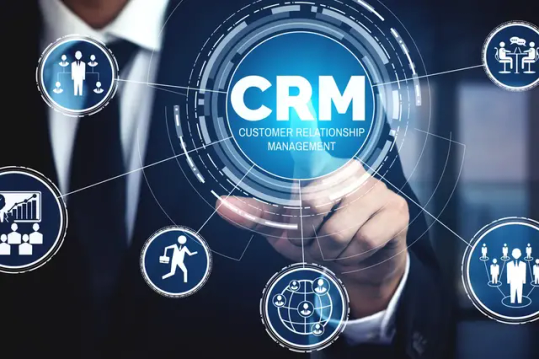
Why Customize CRM?
User Experience: Custom CRM gives you a solution that is intuitive, easy to use, and in line with the day-to-day operations of your team. This minimizes the learning curve and enhances productivity.
Customer Insights: Customized CRM will give you deeper insights into customer behavior, enabling you to create more personalized marketing strategies, improve sales performance, and enhance customer loyalty.
Scalability & Flexibility: As your business grows, your CRM system can grow with it. Because a CRM is highly customizable, scalable solutions expand right alongside your business for lasting success.
At Solid Future, we understand that no two businesses are the same. That’s why we offer CRM customization services that are uniquely designed to fit your specific needs. If you’re ready to unlock the full potential of your CRM system, contact Solid Future today and discover how CRM customization can propel your business forward.
Conclusion:
CRM customization is more than a tool -- it is a strategy to drive better relationships, enhancement of operations, and fueling business growth. Trust Solid Future to help you with the customization of a CRM solution that works for you!
1 note
·
View note
Text
Behind the Code: Open Source CRM Development Unveiled
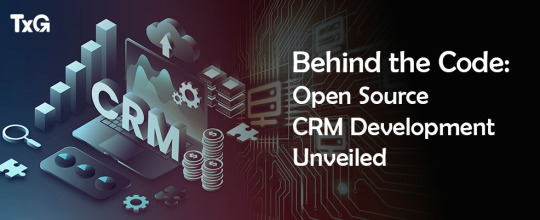
Customer Relationship Management (CRM) is a technology or system that companies use to manage relationships and interactions with current and potential customers. It helps organize contacts, streamline sales processes, and track communications, serving as a centralized hub for all customer-related activities.
Open-source CRM software offers enhanced customization, flexibility, and collaboration. It provides access to the core code, enabling businesses to tailor the tool specifically to their unique needs. CRM systems give valuable insights into customer behaviors and preferences, allowing for more personalized and effective communication. The open-source development process involves a community of developers who collaborate to create, test, and refine the software.
It’s an exciting opportunity for any business looking to unlock the full potential of CRM technology. Book a consultation today to discover how our CRM solutions can be tailored to align with your business needs. Contact us now!
#Open source CRM software#CRM customization#Flexible CRM solutions#Customer relationship management#CRM for businesses#CRM system customization#Open source solutions#CRM flexibility#CRM features#CRM integration
0 notes
Text
#crm customization#business needs#customer relationship management#tailored solutions#business growth#efficiency boost#crm software#small business tips#productivity tools#customer engagement
0 notes
Text
How to Use CRM Software to Improve Customer Relations
Introduction
In today’s competitive market, maintaining strong customer relations is crucial for business success. One of the best ways to achieve this is by using Customer Relationship Management (CRM) software. This article will guide you on how to use CRM software to enhance your customer relations and boost your business performance. Read to Continue
#automating tasks with CRM#benefits of CRM software#best CRM practices#choosing CRM software#CRM and marketing tools#CRM customization#CRM data analysis#CRM for business#CRM for sales automation#CRM reports and dashboards#CRM setup guide#CRM software#customer relations#customer service with CRM#how to use CRM#improving customer relations#integrating CRM tools#tracking customer interactions#understanding customer insights#software solutions
1 note
·
View note
Text
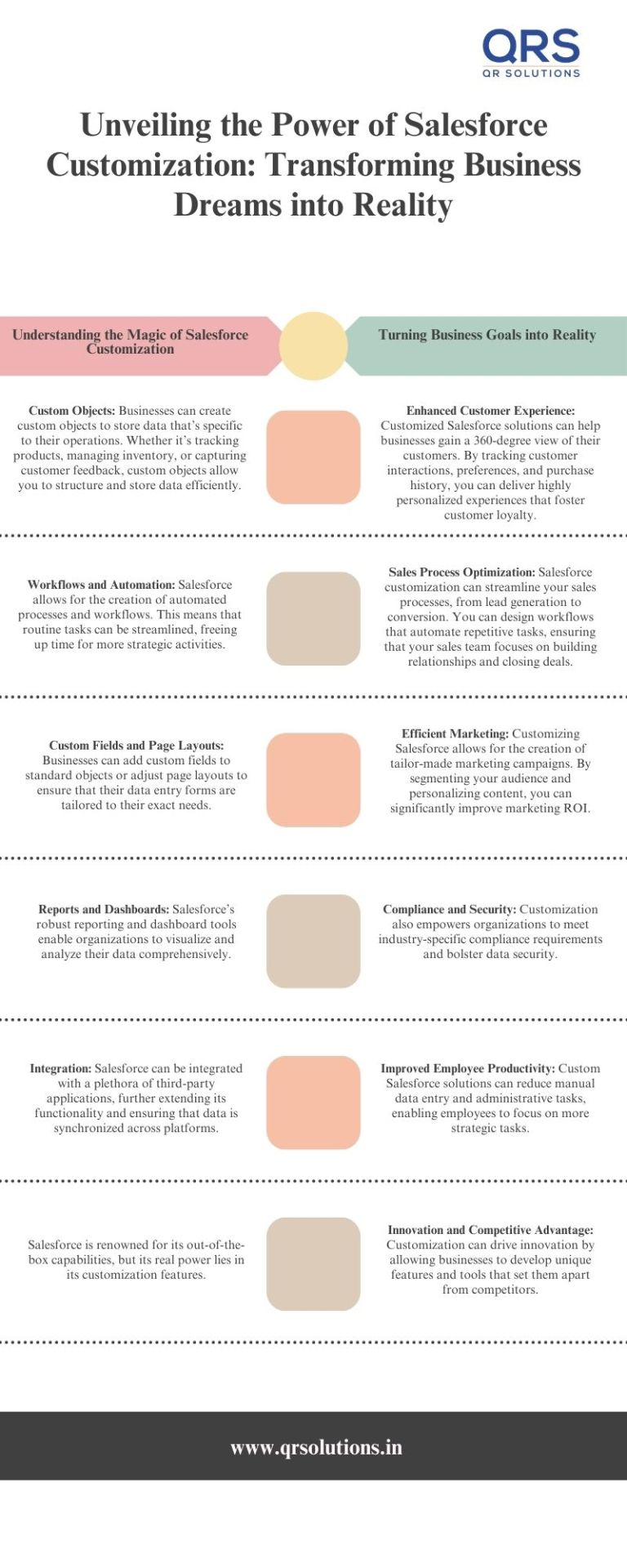
Salesforce customization is not merely an option, it's a necessity in today's rapidly changing business landscape.
To Know More Visit Us:
#Salesforce Customization#salesforce customization services#custom settings in salesforce#custom metadata in salesforce#CRM Customization#Custom Development#Customer Relationship Management#Custom App Development#App Customization#Customer Support#Salesforce Consultants#CRM Optimization
0 notes
Text
Ganesh Shankar, CEO & Co-Founder of Responsive – Interview Series
New Post has been published on https://thedigitalinsider.com/ganesh-shankar-ceo-co-founder-of-responsive-interview-series/
Ganesh Shankar, CEO & Co-Founder of Responsive – Interview Series


Ganesh Shankar, CEO and Co-Founder of Responsive, is an experienced product manager with a background in leading product development and software implementations for Fortune 500 enterprises. During his time in product management, he observed inefficiencies in the Request for Proposal (RFP) process—formal documents organizations use to solicit bids from vendors, often requiring extensive, detailed responses. Managing RFPs traditionally involves multiple stakeholders and repetitive tasks, making the process time-consuming and complex.
Founded in 2015 as RFPIO, Responsive was created to streamline RFP management through more efficient software solutions. The company introduced an automated approach to enhance collaboration, reduce manual effort, and improve efficiency. Over time, its technology expanded to support other complex information requests, including Requests for Information (RFIs), Due Diligence Questionnaires (DDQs), and security questionnaires.
Today, as Responsive, the company provides solutions for strategic response management, helping organizations accelerate growth, mitigate risk, and optimize their proposal and information request processes.
What inspired you to start Responsive, and how did you identify the gap in the market for response management software?
My co-founders and I founded Responsive in 2015 after facing our own struggles with the RFP response process at the software company we were working for at the time. Although not central to our job functions, we dedicated considerable time assisting the sales team with requests for proposals (RFPs), often feeling underappreciated despite our vital role in securing deals. Frustrated with the lack of technology to make the RFP process more efficient, we decided to build a better solution. Fast forward nine years, and we’ve grown to nearly 500 employees, serve over 2,000 customers—including 25 Fortune 100 companies—and support nearly 400,000 users worldwide.
How did your background in product management and your previous roles influence the creation of Responsive?
As a product manager, I was constantly pulled by the Sales team into the RFP response process, spending almost a third of my time supporting sales instead of focusing on my core product management responsibilities. My two co-founders experienced a similar issue in their technology and implementation roles. We recognized this was a widespread problem with no existing technology solution, so we leveraged our almost 50 years of combined experience to create Responsive. We saw an opportunity to fundamentally transform how organizations share information, starting with managing and responding to complex proposal requests.
Responsive has evolved significantly since its founding in 2015. How do you maintain the balance between staying true to your original vision and adapting to market changes?
First, we’re meticulous about finding and nurturing talent that embodies our passion – essentially cloning our founding spirit across the organization. As we’ve scaled, it’s become critical to hire managers and team members who can authentically represent our core cultural values and commitment.
At the same time, we remain laser-focused on customer feedback. We document every piece of input, regardless of its size, recognizing that these insights create patterns that help us navigate product development, market positioning, and any uncertainty in the industry. Our approach isn’t about acting on every suggestion, but creating a comprehensive understanding of emerging trends across a variety of sources.
We also push ourselves to think beyond our immediate industry and to stay curious about adjacent spaces. Whether in healthcare, technology, or other sectors, we continually find inspiration for innovation. This outside-in perspective allows us to continually raise the bar, inspiring ideas from unexpected places and keeping our product dynamic and forward-thinking.
What metrics or success indicators are most important to you when evaluating the platform’s impact on customers?
When evaluating Responsive’s impact, our primary metric is how we drive customer revenue. We focus on two key success indicators: top-line revenue generation and operational efficiency. On the efficiency front, we aim to significantly reduce RFP response time – for many, we reduce it by 40%. This efficiency enables our customers to pursue more opportunities, ultimately accelerating their revenue generation potential.
How does Responsive leverage AI and machine learning to provide a competitive edge in the response management software market?
We leverage AI and machine learning to streamline response management in three key ways. First, our generative AI creates comprehensive proposal drafts in minutes, saving time and effort. Second, our Ask solution provides instant access to vetted organizational knowledge, enabling faster, more accurate responses. Third, our Profile Center helps InfoSec teams quickly find and manage security content.
With over $600 billion in proposals managed through the Responsive platform and four million Q&A pairs processed, our AI delivers intelligent recommendations and deep insights into response patterns. By automating complex tasks while keeping humans in control, we help organizations grow revenue, reduce risk, and respond more efficiently.
What differentiates Responsive’s platform from other solutions in the industry, particularly in terms of AI capabilities and integrations?
Since 2015, AI has been at the core of Responsive, powering a platform trusted by over 2,000 global customers. Our solution supports a wide range of RFx use cases, enabling seamless collaboration, workflow automation, content management, and project management across teams and stakeholders.
With key AI capabilities—like smart recommendations, an AI assistant, grammar checks, language translation, and built-in prompts—teams can deliver high-quality RFPs quickly and accurately.
Responsive also offers unmatched native integrations with leading apps, including CRM, cloud storage, productivity tools, and sales enablement. Our customer value programs include APMP-certified consultants, Responsive Academy courses, and a vibrant community of 1,500+ customers sharing insights and best practices.
Can you share insights into the development process behind Responsive’s core features, such as the AI recommendation engine and automated RFP responses?
Responsive AI is built on the foundation of accurate, up-to-date content, which is critical to the effectiveness of our AI recommendation engine and automated RFP responses. AI alone cannot resolve conflicting or incomplete data, so we’ve prioritized tools like hierarchical tags and robust content management to help users organize and maintain their information. By combining generative AI with this reliable data, our platform empowers teams to generate fast, high-quality responses while preserving credibility. AI serves as an assistive tool, with human oversight ensuring accuracy and authenticity, while features like the Ask product enable seamless access to trusted knowledge for tackling complex projects.
How have advancements in cloud computing and digitization influenced the way organizations approach RFPs and strategic response management?
Advancements in cloud computing have enabled greater efficiency, collaboration, and scalability. Cloud-based platforms allow teams to centralize content, streamline workflows, and collaborate in real time, regardless of location. This ensures faster turnaround times and more accurate, consistent responses.
Digitization has also enhanced how organizations manage and access their data, making it easier to leverage AI-powered tools like recommendation engines and automated responses. With these advancements, companies can focus more on strategy and personalization, responding to RFPs with greater speed and precision while driving better outcomes.
Responsive has been instrumental in helping companies like Microsoft and GEODIS streamline their RFP processes. Can you share a specific success story that highlights the impact of your platform?
Responsive has played a key role in supporting Microsoft’s sales staff by managing and curating 20,000 pieces of proposal content through its Proposal Resource Library, powered by Responsive AI. This technology enabled Microsoft’s proposal team to contribute $10.4 billion in revenue last fiscal year. Additionally, by implementing Responsive, Microsoft saved its sellers 93,000 hours—equivalent to over $17 million—that could be redirected toward fostering stronger customer relationships.
As another example of Responsive providing measurable impact, our customer Netsmart significantly improved their response time and efficiency by implementing Responsive’s AI capabilities. They achieved a 10X faster response time, increased proposal submissions by 67%, and saw a 540% growth in user adoption. Key features such as AI Assistant, Requirements Analysis, and Auto Respond played crucial roles in these improvements. The integration with Salesforce and the establishment of a centralized Content Library further streamlined their processes, resulting in a 93% go-forward rate for RFPs and a 43% reduction in outdated content. Overall, Netsmart’s use of Responsive’s AI-driven platform led to substantial time savings, enhanced content accuracy, and increased productivity across their proposal management operations.
JAGGAER, another Responsive customer, achieved a double-digit win-rate increase and 15X ROI by using Responsive’s AI for content moderation, response creation, and Requirements Analysis, which improved decision-making and efficiency. User adoption tripled, and the platform streamlined collaboration and content management across multiple teams.
Where do you see the response management industry heading in the next five years, and how is Responsive positioned to lead in this space?
In the next five years, I see the response management industry being transformed by AI agents, with a focus on keeping humans in the loop. While we anticipate around 80 million jobs being replaced, we’ll simultaneously see 180 million new jobs created—a net positive for our industry.
Responsive is uniquely positioned to lead this transformation. We’ve processed over $600 billion in proposals and built a database of almost 4 million Q&A pairs. Our massive dataset allows us to understand complex patterns and develop AI solutions that go beyond simple automation.
Our approach is to embrace AI’s potential, finding opportunities for positive outcomes rather than fearing disruption. Companies with robust market intelligence, comprehensive data, and proven usage will emerge as leaders, and Responsive is at the forefront of that wave. The key is not just implementing AI, but doing so strategically with rich, contextual data that enables meaningful insights and efficiency.
Thank you for the great interview, readers who wish to learn more should visit Responsive,
#000#adoption#agents#ai#AI AGENTS#ai assistant#AI-powered#amp#Analysis#approach#apps#automation#background#billion#CEO#Cloud#cloud computing#cloud storage#collaborate#Collaboration#Community#Companies#comprehensive#computing#content#content management#content moderation#courses#crm#customer relationships
5 notes
·
View notes
Text
Social CRM: Engaging Customers Across Platforms for Better Relationships
In today’s digital landscape, where consumers engage with brands across various social channels, the importance of Social Customer Relationship Management (Social CRM) cannot be overstated. By effectively utilizing Social CRM strategies, businesses can foster deeper relationships with customers, enhance engagement, and drive loyalty, all while navigating the complexities of multiple platforms.…
#best practices for brand management#Branding strategies for small businesses#building brand loyalty#business growth strategies#corporate social responsibility#creating a strong brand identity#CRM#customer relationship management#Customers#digital marketing for startups#e-commerce tips for businesses#Engaging#how to scale your business.#how to start a successful business#importance of social media for businesses#influencer marketing for brands#Platforms#Relationships#small business funding options#Social#top business trends 2024
2 notes
·
View notes
Text
How MetricsERP CRM Can Help You Identify High-Value Customers
In the ever-evolving landscape of business, understanding your customers' worth is paramount. The ability to pinpoint high-value customers can significantly impact your revenue, customer retention, and overall growth strategy. MetricsERP CRM emerges as a powerful tool in this quest, offering comprehensive insights and capabilities to identify and nurture your most valuable customers.
The Importance of Identifying High-Value Customers
High-value customers are those who contribute the most to your bottom line. They are loyal, have a higher lifetime value, and often advocate for your brand, attracting more customers. By focusing on these key individuals, businesses can allocate resources more efficiently, tailor marketing efforts, and enhance customer satisfaction.
Features of MetricsERP CRM
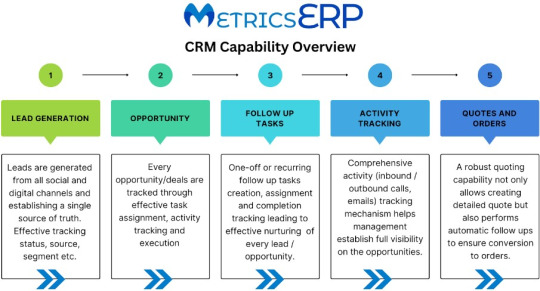
MetricsERP CRM is designed to streamline customer relationship management, providing a suite of tools that help businesses understand and cater to their customers better. Here’s how it can help identify high-value customers:
1. Comprehensive Customer Data Collection
MetricsERP CRM gathers data from various touchpoints, creating a holistic view of each customer. This includes purchase history, browsing behavior, interaction records, and demographic details. With all this information in one place, it’s easier to identify patterns and behaviors indicative of high-value customers.
2. Advanced Analytics and Reporting
The CRM’s advanced analytics tools sift through vast amounts of data to generate actionable insights. Through these insights, businesses can identify customers who consistently make high-value purchases, those who frequently engage with the brand, and those who refer new customers. Customizable reports allow businesses to track these metrics over time, offering a clear picture of customer value.
3. Segmentation and Targeting
MetricsERP CRM allows for precise customer segmentation based on various criteria such as purchase behavior, engagement level, and demographics. By segmenting your customer base, you can identify which groups contribute the most revenue and which have the potential to grow. Targeted marketing campaigns can then be designed to cater to these segments, ensuring that high-value customers receive the attention they deserve.
4. Predictive Modeling
One of the standout features of MetricsERP CRM is its predictive modeling capabilities. By analyzing historical data, the CRM can forecast future customer behavior, identifying those likely to become high-value customers. This proactive approach enables businesses to nurture potential high-value customers early on, maximizing their lifetime value.
5. Customer Lifetime Value Calculation
MetricsERP CRM can calculate the customer lifetime value (CLV) of each customer, providing a clear metric to gauge their worth. By understanding the CLV, businesses can make informed decisions about how much to invest in retaining and nurturing each customer. This calculation takes into account factors such as purchase frequency, average order value, and customer lifespan.
6. Real-Time Monitoring
Real-time monitoring and alerts ensure that businesses are always aware of changes in customer behavior. If a high-value customer shows signs of disengagement, the CRM can trigger alerts for immediate follow-up actions. This ensures that businesses can intervene before it’s too late, maintaining a strong relationship with their most valuable customers.
Implementing MetricsERP CRM for Maximum Impact
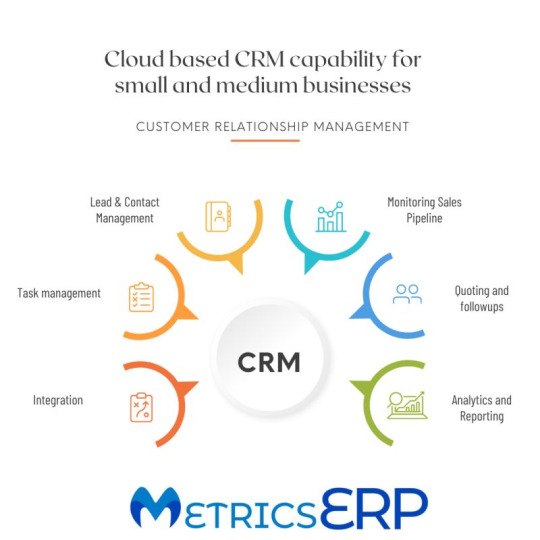
To fully leverage the capabilities of MetricsERP CRM, businesses should follow a structured approach:
1. Data Integration
Integrate all customer data sources into the CRM to ensure a comprehensive view of each customer. This might involve connecting e-commerce platforms, social media channels, and customer service systems.
2. Training and Adoption
Ensure that your team is well-trained on how to use the CRM’s features effectively. Adoption is key to reaping the benefits of any CRM system.
3. Regular Review and Optimization
Regularly review the insights and reports generated by the CRM. Use these insights to refine your strategies and optimize your approach to customer relationship management.
4. Personalization
Utilize the segmentation and targeting features to personalize your interactions with high-value customers. Personalized experiences enhance customer satisfaction and loyalty.
Do you need CRM for Small and Medium Businesses? Book a demo to explore more about how MetricsERP can add value to your business.
Summary
Identifying and nurturing high-value customers is crucial for business success. MetricsERP CRM offers a robust set of tools to help businesses understand their customers better, predict future behaviours, and make data-driven decisions. By leveraging the power of MetricsERP CRM, businesses can ensure that they are focusing their efforts where it matters most, driving growth and profitability.
In the end, the goal is simple: know your customers, value them appropriately, and watch your business thrive. MetricsERP CRM is the key to unlocking this potential, guiding you toward a more strategic and customer-centric approach.
2 notes
·
View notes
Text
Maximizing Customer Relationship Management in the Trucking Industry
Enjoy the latest blog post from FRC - learn why a reliable CRM is worth its weight in gold!
Introduction to Effective CRM Strategies for Trucking Businesses In the fast-paced world of trucking and logistics, maintaining strong customer relationships is the cornerstone of success. For trucking business owners, leveraging Customer Relationship Management (CRM) tools can transform operational efficiency and elevate customer satisfaction. This article looks into the strategic…
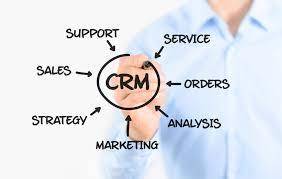
View On WordPress
2 notes
·
View notes
Text
To boost sales, first, understand your customers and their needs. Then, tailor your offerings accordingly. Next, create effective marketing campaigns using online and offline channels, including social media. Train your sales team in communication and persuasion. Offer limited-time promotions to spur sales and use a Customer Relationship Management (CRM) system for personalized marketing. Provide top-notch customer service for repeat business. Encourage upselling and cross-selling. Implement loyalty programs and optimize your e-commerce site. Analyze sales data, study competitors, and network for new opportunities. Content marketing, feedback collection, and diversification are also vital. Adapt these strategies to your unique situation and refine them for success.
#saas software#salesdevelopmentrepresentative#Sales Booster#sales techniques#crm software#boostsales#customer service#SalesBoost#CustomerFocused#SalesTraining#EffectiveMarketing#PromoMania#CRMPro#CustomerDelight#UpsellSuccess#LoyaltyRewards#EcommerceTips
2 notes
·
View notes
Text
How Important is CRM Integrations and Customizations?

In this digital era, businesses worldwide give importance to customer relationship software as satisfied customers are the backbone of a successful business. The businesses using Custom CRM Integration can boost their productivity manifolds. CRM Integrations And Customizations is the process to connect a CRM system with other software applications or systems and tailoring the CRM system as per the business’ specific needs.
CRM Integration?
CRM integration means seamlessly connecting CRM software with third-party applications, business tools, platforms, or databases. This integration ensures that relevant information from different systems is available within the CRM, so that the businesses can get a holistic view of customer data.
CRM Customizations
CRM customizations means tailoring the CRM system to match specific business workflows, processes, or requirements. Customizations include Custom Data Fields, Workflow Automation, User Interface (UI) Customization, and Reporting and Dashboards:
How CRM Integrations and Customizations Helps Strengthen Your Business?
CRM integrations and customizations are essential to maximise the effectiveness of a CRM system and drive. CRM Integrations ensure seamless data flow and synchronisation between the CRM system and other key business systems. By integrating the CRM with other platforms like marketing automation, customer support, etc. businesses can get a complete view of the customer data. An effective CRM system is a win-win solution and a smart integration improves employee productivity, as well as customer experience.
Advantages of Having Customised CRM Integration
It’s Easy to Use
A customised CRM software helps manage multiple processes simultaneously. The custom CRM is designed keeping in mind the issues faced by employees and thus it comes with many valuable features.
Custom-made Features
A CRM system has several in-built features that helps manage complex tasks with ease. With a customised CRM, the businesses have the much needed features without any unnecessary hassles and bustles. CRM integration is designed to smartly manage the workflow and help employees stay more productive.
Better Insights and Higher Revenue
With Custom CRM integration, you can filter and synthesise data exactly the way you want and get the tedious task achieved within a fraction of seconds. The businesses get quick access to real-time insights that help drive your business fast, lower the risks, and explore untapped areas in business.
Conclusion
CRM integrations and customizations are important to optimise the CRM system for specific business needs, streamline operations, improve productivity & data accuracy, and offer a tailored experience to users. These adaptations make the CRM system a more powerful tool and easily aligns with the unique requirements and goals of the business.
By leveraging the power of a customised and integrated CRM System, all size businesses can drive growth, improve customer relationships, and achieve long-term success.
So this time give your sales team a flexible and customised solution that simplifies your task exactly the way you want. If you want to know more about the professional CRM Integrations and Customizations services, feel free to contact Kodehash now.SOURCE URL: https://medium.com/@kodehash8/how-important-is-crm-integrations-and-customizations-12d203a64bb2
2 notes
·
View notes
Text
So I’ve been toying around with this new CRM for my family catering company. It’s a free version so a few limitations but overall pretty great. And I am amazed at how well I figure stuff out on the fly and can reverse engineer things to work to my advantage.
#I’m actually quite smart yall#you wouldn’t know it from this tumblr but I’m a fully functioning adult!#isn’t that crazy?!#lol#anyway#tell your bosses to invest in CRMs bc it’s crazy how many company’s think their manual tracking of customer workflows is a good use of time#our business is literally a 3-man operation and there is NO WAY I’m not getting as much free or cost effective software as possible
4 notes
·
View notes
Link
Salesforce developers can improve productivity, automate business processes, and design custom apps. Contact us for Salesforce App Development.
Maximize your business potential with Salesforce app development services provided by our expert developers. Enhance your business productivity, streamline processes, and deliver custom solutions tailored to your unique business needs. Contact us today to learn more about how the Salesforce app development company can help you achieve your business goals.
#salesforce implementation consultants#Salesforce App Development#Salesforce App Development Company#Salesforce App Development Services#Salesforce app development services company#salesforce consultants#salesforce consulting services#customer relationship management#Salesforce development#Salesforce development companies#Salesforce development company#Salesforce app developers#integrating AI and data with CRM#Hire a Salesforce App Developer
2 notes
·
View notes
Text
6 Steps to Implement CRM Process for Businesses

In today's digital age, customers have become demanding and expect better and more personalized shopping experiences. To meet these demands, businesses need to understand what their customers want and need and provide them with better services and shopping experiences than their competitors. This is why customer relationship management (CRM) software has become an important tool for businesses. CRM helps organizations automate their work processes and intelligently store customer data.
What can CRM do for businesses? CRM software (Customer Relationship Management) is a customer relationship management tool for businesses. It helps automatically store customer data, and classify customers by source, interested products, and purchasing activity. This system has the ability to automatically record the interaction history between employees and customers, ensuring complete care for all customers, avoiding omissions and assigning roles, and managing employee activities to help administrators easily control work efficiency and evaluate sales performance.
In addition, CRM software also integrates features such as connectivity, call support, email marketing, and automatic SMS, helping to automate customer care processes and support. It also helps manage customer profiles and group customer segments to constantly update the information and activities of each customer. The CRM system also allows for customer service management and marketing automation, helping to screen customer targets and evaluate the effectiveness of marketing campaigns.
6 steps to implement the CRM process The process of implementing CRM (Customer Relationship Management) for businesses usually includes the following steps:
Step 1: Analyze needs and set goals Analyzing needs and setting goals is an important first step in implementing a CRM system. Before starting the implementation, the business needs to carefully analyze its needs to determine the most important priorities. After analyzing the business needs, set goals for implementing the CRM system. These goals should be based on the most important priorities of the business. Analyzing needs and setting goals is an important step to help businesses make accurate decisions about implementation and ensure that it meets their goals.
Step 2: Select a CRM system To select a CRM system that is suitable for the goals and needs of the business, it is necessary to clearly define the features and functions.
Step 3: Prepare data Preparing data is the next step in implementing a CRM system. This step involves collecting, cleaning, and organizing customer data to ensure that it is accurate and consistent.
Step 4: Train employees Training employees on how to use the CRM system is an important step in successful implementation. Employees need to understand how to use the system to optimize its benefits.

Step 5: Test the system Before implementing the CRM system, it is important to test it to ensure that it meets the needs and goals of the business.
Step 6: Launch and evaluate After testing the system, launch it and continuously evaluate its performance to ensure that it is meeting the goals of the business. This evaluation process should be ongoing to identify areas for improvement and ensure that the system continues to meet the needs of the business.
Summary In order to connect and provide the best values and experiences for customers, CRM is an essential solution. A business that wants to develop its operations cannot be without a tool to manage customer relationships. These are the 6 steps to implement a CRM process for your business that you may need to know. Pricing levels for CRM software implementation: How much does CRM software cost in Vietnam?
------------------------------------------------------------------------------
6 bước triển khai quy trình CRM cho doanh nghiệp

Trong thời đại số hóa ngày nay, khách hàng đã trở nên khó tính và mong muốn nhận được trải nghiệm mua hàng tốt hơn và cá nhân hóa hơn. Để đáp ứng được những yêu cầu này, các doanh nghiệp cần phải hiểu rõ khách hàng của mình muốn gì và cần gì, và cung cấp cho họ các dịch vụ và trải nghiệm mua hàng tốt hơn đối thủ cạnh tranh.
Đó chính là lý do tại sao phần mềm quản lý quan hệ khách hàng (CRM) trở thành một công cụ quan trọng đối với các doanh nghiệp. CRM giúp các tổ chức tự động hoá quy trình làm việc và lưu trữ dữ liệu của khách hàng một cách thông minh.
CRM có thể giúp gì cho doanh nghiệp
Phần mềm CRM (Customer Relationship Management) là công cụ quản lý quan hệ khách hàng cho doanh nghiệp. Nó giúp lưu trữ tự động dữ liệu của khách hàng, phân loại khách hàng theo nguồn đến, sản phẩm quan tâm, hoạt động mua hàng. Hệ thống này có khả năng tự động lưu lịch sử tương tác của nhân viên với khách hàng, giúp đảm bảo chăm sóc đầy đủ cho tất cả các khách hàng, tránh bỏ sót và phân quyền, quản lý hoạt động nhân viên giúp nhà quản trị kiểm soát dễ dàng hiệu quả làm việc và đánh giá được hiệu quả bán hàng.
Ngoài ra, phần mềm CRM còn tích hợp các tính năng kết nối, hỗ trợ gọi điện, gửi email marketing, SMS tự động, giúp tự động hóa quy trình chăm sóc, hỗ trợ khách hàng. Nó cũng giúp quản lý hồ sơ khách hàng và phân nhóm đối tượng khách hàng để liên tục cập nhật thông tin, hoạt động của từng khách hàng. Hệ thống CRM còn cho phép quản lý dịch vụ khách hàng và tự động hóa tiếp thị, giúp sàng lọc đối tượng khách hàng và đánh giá hiệu quả của các chiến dịch marketing.
6 bước triển khai quy trình CRM
Quy trình triển khai CRM (Customer Relationship Management) cho doanh nghiệp thường bao gồm các bước sau đây:
Phân tích nhu cầu và đặt mục tiêu
Phân tích nhu cầu và đặt mục tiêu là bước đầu tiên quan trọng trong việc triển khai hệ thống CRM. Trước khi bắt đầu triển khai, doanh nghiệp cần phân tích cẩn thận các nhu cầu và mục tiêu của mình để xác định được các ưu tiên quan trọng nhất. Sau khi phân tích các nhu cầu của doanh nghiệp, cần đặt mục tiêu cho việc triển khai hệ thống CRM. Các mục tiêu này nên được xác định dựa trên những ưu tiên quan trọng nhất của doanh nghiệp. Việc phân tích nhu cầu và đặt mục tiêu là một bước quan trọng để giúp doanh nghiệp đưa ra quyết định chính xác về việc triển khai và đảm bảo rằng nó đáp ứng được các mục tiêu của doanh nghiệp.
Lựa chọn hệ thống CRM
Để chọn được một hệ thống CRM phù hợp với mục tiêu và nhu cầu của doanh nghiệp, cần phải xác định rõ những tính năng và chức năng.
Một số tính năng và chức năng cần thiết của hệ thống CRM có thể bao gồm:
Quản lý thông tin khách hàng
Quản lý bán hàng
Tích hợp email marketing
Tích hợp social media
Quản lý dịch vụ khách hàng
Báo cáo và phân tích
Đào tạo và triển khai
Đào tạo nhân viên về cách sử dụng hệ thống là một công việc quan trọng để đảm bảo hiệu quả trong triển khai này trên toàn bộ doanh nghiệp.
Đầu tiên, cần xác định nhu cầu đào tạo của từng bộ phận trong doanh nghiệp, bao gồm các nhân viên bán hàng, dịch vụ khách hàng, marketing, quản lý và các bộ phận khác. Cần đánh giá cấp độ hiểu biết của từng nhân viên về hệ thống CRM để xác định mức độ đào tạo cần thiết. Sau khi đánh giá nhu cầu đào tạo, cần xây dựng kế hoạch đào tạo bao gồm thời gian, địa điểm và nội dung đào tạo. Kế hoạch cần phù hợp với lịch làm việc của từng bộ phận và tối ưu hóa hiệu quả đào tạo.
Cần chọn đội ngũ đào tạo có chuyên môn và kinh nghiệm trong lĩnh vực CRM để đảm bảo chất lượng đào tạo.
Sau khi đào tạo đã hoàn thành, cần đánh giá hiệu quả đào tạo bằng cách kiểm tra kiến thức và kỹ năng của các nhân viên và đánh giá kết quả thực tiễn. Nếu cần, cần tiếp tục đào tạo để nâng cao hiệu quả sử dụng hệ thống
Thiết lập dữ liệu
Việc thiết lập các thông tin khách hàng cần thiết trong CRM là một bước quan trọng để đảm bảo rằng doanh nghiệp có thể quản lý thông tin khách hàng một cách hiệu quả và tối ưu hóa hoạt động của mình.
Tối ưu hoá hệ thống
Theo dõi và đánh giá hoạt động của hệ thống CRM, tối ưu hoá các chức năng và tính năng để đáp ứng được nhu cầu kinh doanh và đem lại hiệu quả tốt nhất.
Điều chỉnh và cập nhật
Điều chỉnh và cập nhật hệ thống để đáp ứng được các thay đổi trong doanh nghiệp và thị trường. Việc này giúp cho doanh nghiệp có thể tăng khả năng cạnh tranh và duy trì tồn tại trên thị trường.
Lời kết
Để có thể kết nối và mang lại những giá trị, trải nghiệm tốt nhất cho khách hàng. CRM là một giải pháp thiết yếu. Một doanh nghiệp muốn phát triển kinh doanh thì không thể thiếu một công cụ quản lý mối quan hệ với khách hàng. Đây là 6 bước triển khai quy trình CRM cho doanh nghiệp mà bạn có thể cần biết.
Các mức giá triển khai phần mềm CRM:
Chi phí cho phần mềm CRM Việt Nam là bao nhiêu?
2 notes
·
View notes
Text
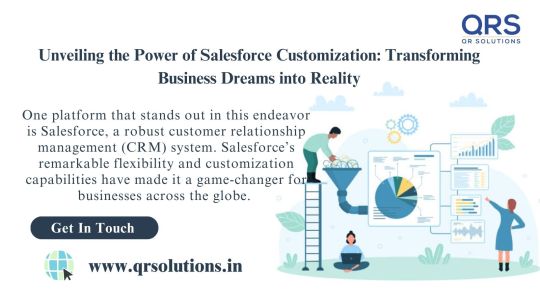
Salesforce customization is not merely an option, it's a necessity in today's rapidly changing business landscape.
To Know More Visit Us:
#Salesforce Customization#salesforce customization services#custom settings in salesforce#custom metadata in salesforce#CRM Customization#Custom Development#Customer Relationship Management#Custom App Development#App Customization#Customer Support#Salesforce Consultants#CRM Optimization
0 notes
Link
GetOnCRM's expert consultants are leading the way in revolutionizing customer relationships with the Salesforce Digital Experience Platform. With our expertise, businesses can enhance customer experience and increase customer satisfaction.
#salesforce#salesforce crm#Salesforcepartner#CRM#consultingservices#SalesforceConsultant#digital experience#GetOnCRM#customer experience
6 notes
·
View notes